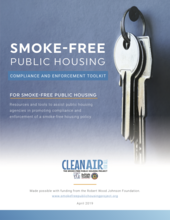Found 264 resources.
0
0
0
Approximately one in five adults reported experiencing household food insecurity in both spring 2020 and again in summer 2022, after a decline in reported food insecurity in spring 2021. High food price inflation, along with elevated costs for other basic needs, such as transportation and rent, have likely eroded food budgets in the last year. In addition, some of the safety net responses that buffered food insecurity in 2021 are no longer in place. In this brief, we use data from the Health Reform Monitoring Survey, a nationally representative survey of nonelderly adults, to assess food...
Topics: Food insecurity, Research, Stability
 Shared by Sandra Ware
on Oct 27, 2022
Shared by Sandra Ware
on Oct 27, 2022 0
0
0
Disabled individuals and families in federally assisted housing face multiple challenges in gaining access to housing units and services that meet their needs—despite legal frameworks meant to help them. This brief focuses on working-age disabled individuals and families with a disabled household member who live in federally assisted housing. It presents evidence of the challenges with federally assisted housing processes and supports for residents with disabilities, and provides recommendations that could help these processes and supports better meet legal obligations and resident needs.
Topics: Disabilities, Family engagement, Housing
 Shared by Sandra Ware
on Oct 27, 2022
Shared by Sandra Ware
on Oct 27, 2022 0
0
0
NCHPH has catalogued promising practices on health center and housing partnerships that were identified during T/TA activities. Some promising practices in this publication include collaboration strategies to address COVID-19, flu vaccination efforts, smoking cessation, access to health care, and more.
Topics: Health
 Shared by Gabe Castro
on Sep 23, 2022
Shared by Gabe Castro
on Sep 23, 2022 0
0
0
This brief describes the findings of an online mapping resource that shows the distribution of Social Determinants of Health (SDOH) indicators across counties with Public Housing Primary Care (PHPC) health centers.
Topics: Place-based
 Shared by Gabe Castro
on Sep 23, 2022
Shared by Gabe Castro
on Sep 23, 2022 0
0
0
Getting regular exercise can be a challenge, but there are many positive benefits, particularly for
people with diabetes.
Topics: Exercise, Health, Healthy homes, Nutrition
 Shared by Gabe Castro
on Sep 23, 2022
Shared by Gabe Castro
on Sep 23, 2022 0
0
0
The Effects of ‘Food Deserts’ on Public Housing Residents Living with Diabetes
Topics: Energy, Exercise, Health, Healthy homes, Mobility, Nutrition
 Shared by Gabe Castro
on Sep 23, 2022
Shared by Gabe Castro
on Sep 23, 2022 0
0
0
This toolkit by NCHPH and NNCC provides information and resources for health center staff to partner and collaborate more effectively with their local housing authorities and with other providers serving residents of public housing and other low-income housing.
Topics: Health, Partnerships
 Shared by Camille Anoll-Hunter
on Sep 23, 2022
Shared by Camille Anoll-Hunter
on Sep 23, 2022 0
0
0
State and local policymakers are making consequential decisions about the treatment of race and racism in schools. It is crucial, right now, to slow down, consider the evidence from research and experience, and apply that knowledge to improve teaching about race and racism.
Authored in partnership between the Aspen Institute Education & Society Program and Dr. Francesca López, Professor & Waterbury Chair of Equity Pedagogy at Penn State University, United We Learn looks at empirical research on teaching about race and racism, across more than 40 studies on child development,...
Topics: Education, Racial inequalities, Research
 Shared by Kirsten Greenwell
on Oct 22, 2021
Shared by Kirsten Greenwell
on Oct 22, 2021 0
0
0
The National CLAS Standards are intended to advance health equity, improve quality, and help eliminate health care disparities by establishing a blueprint for health and health care organizations
Topics: Communications, Health, Immigrants
 Shared by Camille Anoll-Hunter
on Aug 26, 2021
Shared by Camille Anoll-Hunter
on Aug 26, 2021 0
0
0
A Playbook for Local Health Department Strategies in the United States
Topics: COVID-19, Health
 Shared by Camille Anoll-Hunter
on Aug 26, 2021
Shared by Camille Anoll-Hunter
on Aug 26, 2021 0
0
0
Every child in an early childhood setting should have a teacher with specialized education to promote that child’s cognitive, social, emotional, and physical development and who prepares them for success in school and in life. The National Research Council’s report from a panel of experts, Transforming the Workforce for Children Birth Through Age 8: A Unifying Foundation, lays out several recommendations for programs serving children from birth through age 8, notably that teachers "should have at a minimum a bachelor’s degree and specialization in the knowledge and competencies needed to...
Topics: Early childhood, Education, Post-secondary
 Shared by Kirsten Greenwell
on Jun 30, 2021
Shared by Kirsten Greenwell
on Jun 30, 2021 0
0
0
Topics: Attendance, COVID-19, Early childhood, Education, Family engagement, Housing, Low-income, Out-of-school time, Youth
 Shared by Kirsten Greenwell
on Jun 17, 2021
Shared by Kirsten Greenwell
on Jun 17, 2021 0
0
0
In March 2020, the COVID-19 pandemic forced many public housing authorities (PHAs) to quickly adjust their operational procedures to protect their staff while providing emergency assistance to residents. Many PHAs had to close their offices and convert to remote operations almost overnight, while staff focused on supporting their tenants by delivering them food, doing wellness checks for vulnerable residents, and ensuring they had access to and in some cases providing the technology needed for children to attend school remotely and isolated residents to remain connected to friends, family,...
Topics: Advocacy, COVID-19, Data sharing, Health, Housing, Safety, Supportive housing
 Shared by Housing Is
on May 25, 2021
Shared by Housing Is
on May 25, 2021 0
0
0
Colleges support students with advising, counseling, or coaching in academics and other skills they need to succeed in school. Some colleges enhance those services through reduced adviser caseloads and more comprehensive, frequent guidance, which can improve students’ semester-to-semester retention and average credits earned. This overview describes important lessons on designing and implementing those services. College leaders and administrators committed to designing, building, managing, and continually supporting enhanced advising services can consult this checklist of recommendations as...
Topics: Attendance, Child welfare, Community development, Education, Grade-level proficiency, Post-secondary, Workforce development
 Shared by Housing Is
on Mar 4, 2021
Shared by Housing Is
on Mar 4, 2021 0
0
0

In California, more than 3.7 million students were eligible for free or reduced priced school meals in the 2017-2018 school year. For many of those students, school meals are the primary source of regular access to healthy food. When the bell rings at 3:00 or lets out for summer break, many of those students go home to nutritional uncertainty or high-calorie, low-nutrient foods.
For many low-income families, the out-of-school-time food access gap increases family stress: limited budgets are stretched further to cover food, rent, utilities, transportation, medications, and chidcare costs....
Topics: Advocacy, Early childhood, Food insecurity, Health, Healthy homes, Housing, Legislation & Policy, Low-income, Nutrition, Out-of-school time, West Coast, Youth
 Shared by Linda Lu
on Dec 4, 2019
Shared by Linda Lu
on Dec 4, 2019 0
0
0

A majority of property managers report that a smoke-free policy is largely well followed and self enforced by residents and staff. However, it is not uncommon for a small minority of residents to struggle or refuse to comply by continuing to smoke or allowing their guests to smoke on the property. These resources and tools can assist management in promoting compliance and enforcing the policy when necessary. If you would like to consult on solutions specific to your situation, reach out to info@smokefreepublichousingproject.org.
Topics: Health, Healthy homes, Smoke-free
 Shared by Jackie Siewert
on Oct 3, 2019
Shared by Jackie Siewert
on Oct 3, 2019 0
0
0
The Department of Housing and Urban Development (HUD) has announced its intention to roll back protections for transgender people experiencing homelessness. The newly proposed rule, which is in the early stages of the rulemaking process and has not yet been publicly posted to the Federal Register, would allow homeless shelters to discriminate based on gender identity, putting transgender people in danger of violence and further housing instability. This is part of a long string of attacks the Trump administration has directed toward the transgender community, such as implementing the infamous...
Topics: Health, Homelessness, Housing, Legislation & Policy, Racial inequalities
 Shared by Housing Is
on Jun 13, 2019
Shared by Housing Is
on Jun 13, 2019 0
0
0

A more regional approach to care is needed – one that involves coordinated, person-centered healthcare with robust connections to social services and community resources. An innovative infrastructure to do just that is underway in four communities across New Jersey: Trenton, Camden, Newark, and Paterson. Efforts begun in 2011 under New Jersey’s Medicaid Accountable Care Organization (ACO) Demonstration Project have evolved into four regional collaboratives that integrate, coordinate, and align all the disconnected programs aimed at making communities healthier.
Topics: Data sharing, East Coast, Health, Partnerships
 Shared by Housing Is
on Jun 13, 2019
Shared by Housing Is
on Jun 13, 2019 0
0
0
Zoning rules dictate more than just how we can use and build on land. They also shape our communities and our lives. Land use laws determine where we can find housing, schools, and parks—and who has access to them.
Topics: Health, Housing, Legislation & Policy, Racial inequalities
 Shared by Housing Is
on Jun 13, 2019
Shared by Housing Is
on Jun 13, 2019 0
0
0

Opened in summer 2018 on the north side of Columbus, Ohio, Laurel Green Apartments is an affordable permanent supportive housing development for residents with mental health conditions.
Topics: Homelessness, Housing, Low-income, Mental health, Supportive housing
 Shared by Housing Is
on Jun 11, 2019
Shared by Housing Is
on Jun 11, 2019 0
0
0
The Trump Administration is publicly weighing plans to gradually lower the official poverty line by applying a smaller cost-of-living adjustment each year. Doing so would be unjustified for several reasons.
Topics: Child welfare, Food insecurity, Legislation & Policy, Low-income, Nutrition, Stability
 Shared by Housing Is
on Jun 11, 2019
Shared by Housing Is
on Jun 11, 2019 0
0
0
Authored by Civic and the Everyone Graduates Center at the Johns Hopkins University School of Education, and released annually in partnership with the Alliance for Excellent Education and America’s Promise Alliance, the Building a Grad Nation report examines both progress and challenges toward reaching the GradNation campaign goal of a national on-time graduation rate of 90 percent.
Topics: Education, Low-income, Research, Youth
 Shared by Housing Is
on Jun 11, 2019
Shared by Housing Is
on Jun 11, 2019 0
0
0

This paper analyzes why SNAP benefits are inadequate, reviews the body of research showing positive effects from more adequate SNAP benefits, and offers key policy solutions to improve benefit adequacy.
Topics: Food insecurity, Health, Legislation & Policy, Low-income, Nutrition, Research
 Shared by Housing Is
on Jun 11, 2019
Shared by Housing Is
on Jun 11, 2019 0
0
0
Policies such as those outlined in the draft proposed rule are having, and will continue to have a significant detrimental impact on survivors of domestic violence and sexual assault by deterring immigrant families, including those with U.S. citizen and Lawful Permanent Resident children, from accessing critical help when they need it. Housing assistance is a vital resource for survivors, giving them the security they need to leave abuse without having to fear that doing so will result in homelessness, as well as providing a safe environment to begin their recovery.
Topics: Domestic violence, Homelessness, Housing, Immigrants, Legislation & Policy
 Shared by Housing Is
on Jun 7, 2019
Shared by Housing Is
on Jun 7, 2019 0
0
0
On May 10, 2019, the Department of Housing and Urban Development (HUD) proposed a rule that would significantly change the agency’s eligibility requirements for federal housing assistance based on immigration status.
Topics: Housing, Immigrants, Legislation & Policy
 Shared by Housing Is
on Jun 7, 2019
Shared by Housing Is
on Jun 7, 2019 
